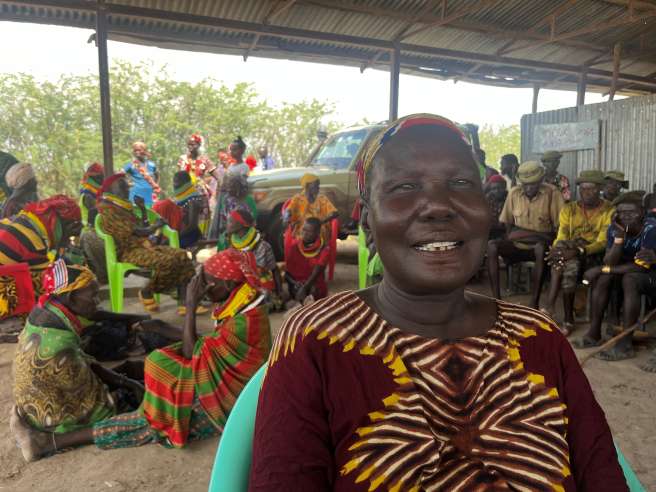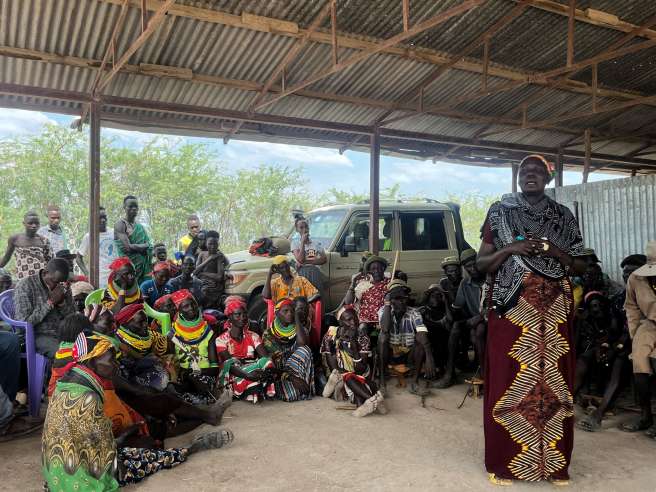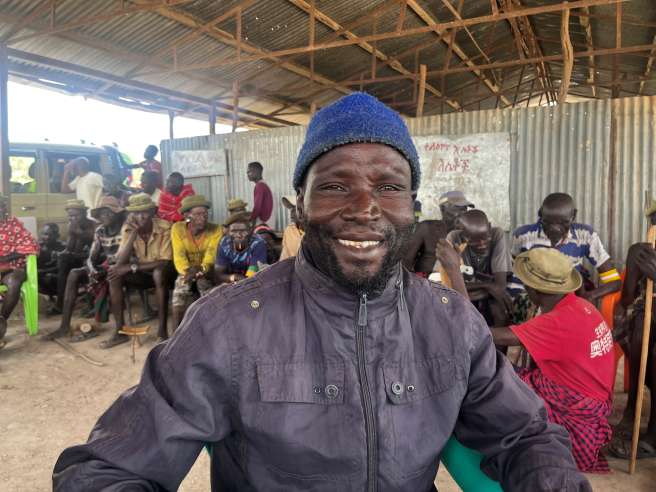‘Now our children are growing up without the sound of guns’
Along the border between southern Ethiopia and northern Kenya lives a nomadic herding community called the Nyangatom, who rely on rearing and selling livestock to feed their families and make an income.
The Nyangatom live in an area prone to conflict as herding communities on both sides of the border raid each other’s land, fighting for precious water and livestock. As a consequence herders are often heavily armed, often with AK-47s, and clashes have led to deaths.
Encouraging peace, not war
My brother was killed by the Turkana. Not long after a Turkana woman came to our village and many people wanted to kill her in revenge but I sent a message to the police. That lady said to me, you are Mama Peace, you saved my life.
Image credits and information

Together with local partners, Christian Aid is working with the Nyangatom, Turkana and Dassenech people who all live along the border to roll out a programme incorporating peacebuilding, development and humanitarian activities to tackle the underlying forces driving conflict between these different communities.
With funding from Christian Aid, our local partners PACIDA and Agri Service have provided training to peace committees on both sides of the border on how to pre-empt as well as to mediate and resolve conflicts and disputes when they do arise. Mama Peace is a member of one of these committees.
“We want to preach about peace to other people and share our ideas. I work with women and men in all three communities,” she said.
According to Mama peace, reaching women with peace messages is the key to reducing conflict between communities.
I prioritise women because they encourage men to go to war. They are a key for war but also a key for peace. The only thing they are talking and preaching about now is peace.
Fighting over scare water and pasture
These border communities are also having to contend with realities of living on the frontline of the climate crisis, which also increases pressure on natural resources that can result in violence.
These areas are prone to prolonged droughts often leading to conflict between nomadic herders from both sides of the border as they compete over dwindling natural resources such as pasturelands and water for their livestock to survive.
Flash flooding is also a common issue for areas suffering extended drought and is a consequence of the rock-hard soil being unable to absorb rainwater. This often leads to people having to abandon their homes as well as the deaths of valuable livestock, pushing people further into poverty.
This in turn increases the risk of cattle rustling that can lead to a cycle of reprisal violence between communities.
The peace committee members are trained to consider the impact of competition over water and pastures in their resolution efforts.
To further tackle this issue, our local partners have also built four waterpoints across Nyangatom and Dassenech where people can get clean drinking water. In Dassenech, a community pond was also built where herders can bring their animals to drink from. The waterpoints as well as the pond are also being used by people from the Turkana community in agreement with the Nyangatom and Dassenech communities, helping to further reduce the risk of conflict between them, with water committees set up to monitor their use.
Image credits and information

Pouring cold water on the heat of war
This project has also set up over 100 youth herder committees who have been trained to mediate and resolve disputes and act as an early warning system to prevent violence from escalating.
Naresie Maia from the Nyangatom community is one of those youth herders. He said: “Before this project, if members from the Nyangatom and Turkana communities saw each other, we started fighting.”
“The problem before was that we had enough water but we didn’t have enough pasture. The Turkana had pasture but no water. So we were waiting for them to come for our water and then killing them. And then they attacked us when we went to Turkana for their pasture.”
“Now we say ‘why are we dying and losing our animals for nothing? Why don’t we graze together?,” he added.
Image credits and information

In addition to forging agreement around the use of natural resources, Naresie said that committee members are also responsible for tracking and returning stolen animals, helping to simmer down any risk of brewing violence.
“We follow the tracks of the animals and return them back to the owner,” he said.
“We try to return what has been stolen from both sides and punish the thief. We are pouring cold water on the fire,” he added.
For Naresie, the support provided through the project has made a real difference to the lives of people in both communities.
“We are now sharing food. The women of Turkana bring us food and the women of Nyangaton share food with them. I now have a wife from Turkana and I have two kids with her,” he said.
Now our children are growing up without the sound of guns.
We'll use your donation to help families around the world to overcome poverty and injustice, wherever the need is greatest.
